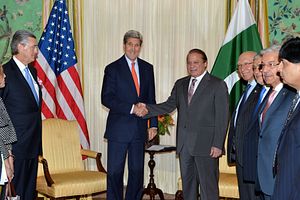When Pakistani Prime Minister Nawaz Sharif meets with U.S. President Barack Obama this week, he will find an administration and a city that is rapidly losing interest in his country except insofar as Pakistan can help extract the United States from the Afghan quagmire.
Afghanistan will dominate the discussions between the two leaders. For once, Pakistani and U.S. interests in Afghanistan are broadly aligned. Pakistan applauded Obama’s decision last week to slow the drawdown of U.S. troops from Afghanistan. Both countries want a peaceful and stable Afghanistan. Both want the Afghan economy to anchor growing regional trade. Neither wishes to see the Islamic State expand in Afghanistan, or Afghanistan revert to its pre-2001 status as a safe haven for extremists plotting overseas terrorism.
Nonetheless, Afghanistan offers tough challenges that may make it difficult to translate these shared interests into on-the-ground successes.
Most immediately pressing is the upsurge of Taliban attacks in Afghanistan. Many of these originate from bases in Pakistan. Several notable attacks have been carried out by the Haqqani network, long a client of the ISI, Pakistan’s premier intelligence agency. Reports that an ISI officer was among those killed when the United States mistakenly attacked a Medicins Sans Frontieres hospital in Kunduz earlier this month have reinforced Afghan suspicions that Pakistan is the mastermind behind the violence that has rocked Afghanistan this year.
Washington will continue to demand that Pakistan do more to prevent such attacks. The United States will also continue to launch drone attacks against targets in Pakistan. While the army and the political establishment in Islamabad have acquiesced in such attacks, it will take only one misdirected missile to reignite popular anger in Pakistan against the drones, and against the power employing them.
Washington is also dismayed by the deterioration in relations between Islamabad and Kabul that has taken place in recent months. When Afghan President Ashraf Ghani assumed office a year ago, he seemed determined to reverse what had been a long history of hostility between the two countries. Sharif appeared amenable. But the inability of either country to stop cross-border attacks against the other has encouraged a revival of the old animosities between the two. Firing across the border (which Afghanistan has never formally accepted) is commonplace. Officials in each country routinely denounce the perfidy of the other. What twelve months ago had seemed a promising rapprochement between the two has withered.
The stalled peace talks between the Ghani government and the Taliban—more precisely, talks about talks—also lend an air of urgency to the current situation. The United States is counting heavily on Pakistan to get the Taliban to return to the negotiating table. Perhaps too heavily; Washington may be in danger of placing too many of its Afghan eggs in a Pakistani basket.
Many worry that the United States has maneuvered itself into a position where some tolerable level of success in Afghanistan is attainable only if Pakistan exerts sufficient pressure on the Taliban to negotiate. Moreover, to negotiate in good faith. And, even more difficult, to abide by the promises it makes at the negotiating table.
Yet it is not clear that the Pakistan military aligns its objectives this closely to those of the Americans. Even if it does, does Pakistan have this leverage over the Taliban? Just as the George W. Bush and Obama administrations have found that U.S. leverage over Islamabad is limited, Pakistan may find that its leverage over the Taliban is similarly finite.
Pakistani fears about India, which remains for the Pakistani security establishment the existential enemy, will also bring a discordant note to the Sharif-Obama talks. Perhaps because of Pakistan’s long history of fomenting trouble in Indian-controlled portions of Kashmir, Islamabad is obsessed with machinations of Indian diplomats and intelligence operatives based in Afghanistan who, Pakistan asserts, are actively promoting insurrection and separatism in Baluchistan, the tribal areas, and other parts of Pakistan.
The Obama administration is anxious for regional partners, including India, to play a significant role in the pacification, stabilization, and rebuilding of Afghanistan. A greater role for India in Afghanistan is the last thing Islamabad wishes to see. For its part, Pakistan believes that the United States has irrevocably thrown in its lot with India, and that the U.S. is not to be trusted when it comes to India.
Even if he wants to deal this week, Sharif has virtually no authority to commit Pakistan on matters relating to Afghanistan, which has been and remains exclusively the army’s responsibility. The displacement as national security adviser a few days ago of Sharif’s longtime confidant Sartaj Aziz by a recently retired Pakistani three-star represented another assertion of the army’s leading role in decision making on key security issues.
In a weird way, the prime minister this week finds himself in the role of a sherpa, a subordinate official who prepares for an upcoming summit. He will have preliminary discussions, take soundings, and report back to Islamabad for decisions to be made prior to the next visit to Washington by the army chief. It is not an auspicious opportunity for consequential diplomacy.
Robert M. Hathaway is a Public Policy Fellow at the Woodrow Wilson Center and, most recently, co-editor of New Security Challenges in Asia.

































